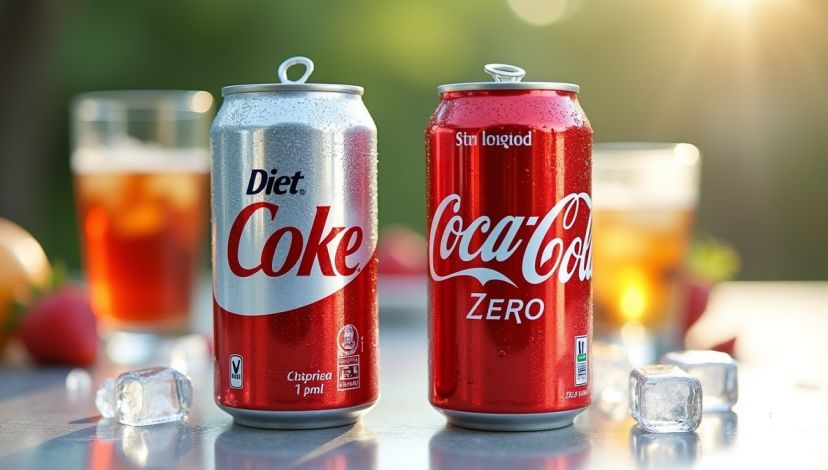
In the area of zero-calorie sodas, Diet Coke and Coke Zero are two of the most loved brands in the whole world. Yet, many consumers wonder about the difference between Diet Coke and Coke Zero — are they just different labels for the same product, or do they really offer unique tastes and ingredients? Being aware of these distinctions, you may select the drink that best fits your preferences in taste and aligns with your lifestyle objectives, particularly in the environment of the current health market.
Though Diet Coke and Coke Zero are both drinks that attempt to be the perfect alternative to the original cola-flavored drink, without the sugar or the calories, they still differ in production, taste, caffeine, and targeted consumer. All of that is of concern to soda enthusiasts, health-aware consumers, or even to people with caffeine-control objectives.
This informative text provides the breakdown of the primary differences, nutritional value, taste, and history of these two beverages, showing professional experience and real-life experiences to demonstrate what distinguishes between them.
Key Takeaways:
- Diet Coke sells a light yet different-tasting drink with more caffeine and a special flavor combination.
- Coke Zero is more similar to cola Coke, and it has two artificial sweeteners rather than one.
- Both are sugar-free and calorie-free, yet differ in the composition and target audiences.
What Is the Core Difference Between Diet Coke and Coke Zero?
In 1983, Diet Coke was introduced to be the first significant sugar-free cola, which retained a unique, light flavour profile to the legendary Coke classic. It eventually became the to-be-first choice of zero-calorie soda to the people who wanted to taste something new and have fewer calories.
Coke Zero, rebranded in 2016, targets consumers seeking zero calories with a taste close to original Coke. Coca-Cola first targeted young adult males who wanted original Coke’s taste without the sugar or calories..
Variation in Tastes and Ingredients
Taste Profile: Diet Coke is also lighter, crisper, and with another range of natural tastes. Coke Zero is also flavored more like a regular Coca-Cola with more fuller, more traditional cola taste.
Sweeteners: Diet Coke contains only aspartame, but Coke Zero contains a combination of aspartame and acesulfame potassium, which not only adds more sugar-like sweetness, but also betters the resemblance to sugar in taste.
Other Ingredients: Coke Zero does not include Diet Coke as it has the ingredient potassium citrate. On the other hand, Coke Zero does not have citric acid, which Diet Coke has.
Expert Insight:
Anna Wheeler, Health and Nutrition Manager of Coca-Cola Great Britain, tells us:
Coca-Cola Zero Sugar is more like Coca-Cola Classic in appearance and flavor since it carries a sweeter and fuller taste due to the variety of flavors used to prepare it. Diet Coke is on the other hand lighter tasting since it is made by the use of another combination of flavors.
NB: the discreet variations in the recipe have meant that Coke Zero is more popular with people who want the traditional Coke taste but not the sugar, whereas Diet Coke is more popular with the people who want Diet Coke but not the additional certainty of the medium depth of cola.
Caffeine Content and Nutritional Facts: Which One Serves You as an Achievement in Health?
Though the two sodas are both zero calories, zero sugar, and zero fat, there exist significant disparities in other elements, such as on caffeine and phosphorus.
| Nutritional Element | Diet Coke (12 oz) | Coke Zero Sugar (12 oz) |
| Calories | 0 | 0 |
| Sugar | 0 g | 0 g |
| Fat | 0 g | 0 g |
| Carbohydrates | 0 g | 0 g |
| Sodium | 40 mg | 40 mg |
| Potassium | Not present | 60 mg |
| Phosphorus | 27 mg | 54 mg |
| Caffeine | 46 mg | 34 mg |
| Artificial Sweeteners | Aspartame | Aspartame, Acesulfame K |
Table 1: Comparison of Nutritional Value in Diet Coke and Coke Zero Sugar
ALT Text: Diet Coke and Coke Zero Sugar nutritional comparison including caffeine, sweeteners, and minerals differences.
Health Considerations
- Caffeine: Diet Coke has approximately 46 mg in every 12-ounce, which is more than 30 percent of the amount of caffeine in the Coke Zero (34 mg). This difference may be huge to caffeine-sensitive individuals and those who consume it in the evenings.
- Phosphorus: The amount of phosphorus in Coke Zero is approximately twice that of Diet Coke (54 mg in comparison to 27 mg). Unnecessary phosphorus can also affect the well-being of the bones and absorption of minerals, which is essential in case of kidney problems or the risk of developing osteoporosis.
- Sodium and Potassium: These two are of equal sodium content, but here the difference is noticed in the mineral variance as Coke Zero contains potassium citrate.
It is important to bear in mind that the two sodas are zero calorie and, thus, acceptable in weight management, provided one takes them in moderation.
Consumer tastes: Who Drinks Diet Coke and Who Takes Coke Zero?
The difference between Diet Coke and Coke Zero is also a story about consumer targeting and lifestyle preferences.
- Diet Coke: Diet Coke is traditionally preferred by those customers who want to taste something unusual and which reminds the classic Coke in a different way. Its milder taste is something that is liked by those who need to have a change or are aware of the history of the brand since the 1980s. Excess caffeine is also present in it, so it is renowned as a favourite among people when they are looking to have some additional energy in them.
- Coke Zero: It is targeted and sold to the young adults and male to consume a zero-calorie beverage which is more like Coca-Cola. Its rebranding into Coca-Cola Zero Sugar strengthened its role as the most osmotic sugar-free version of the classic Coke. This attraction is facilitated by its richer taste.
In Real Life:
Consider the case of such a woman as Sarah, a 28-year-old marketing executive, who must keep herself awake during evenings at work. Her favorite beverage is Diet Coke since it contains additional caffeine, which keeps her concentrated. In the meantime, Mike, a 25-year-old sports fan, loves the original taste of Coke when it is not rich in calories, and, therefore, chooses Coke Zero in the gym.
The given instance indicates that the preference related to taste and caffeine requirements usually determines the selection of either of the two.
Diet Coke against Coke Zero Sugar: Full comparative table
| Feature | Diet Coke | Coke Zero Sugar |
| Launch Year | 1983 | 2005 (rebranded 2016) |
| Target Audience | General, with a strong appeal to women | Younger adults, male-focused marketing |
| Sweeteners | Aspartame only | Aspartame + Acesulfame Potassium |
| Taste | Lighter, distinct blend | Close to classic Coca-Cola |
| Calories | 0 | 0 |
| Sugar | 0 g | 0 g |
| Caffeine | 46 mg per 12 oz | 34 mg per 12 oz |
| Phosphorus | 27 mg | 54 mg |
| Additional Ingredients | Citric Acid | Potassium Citrate |
| Flavor Notes | Crisp, sharper flavor | Richer, bolder flavor |
Table 2 Side by Side Feature Comparison Diet Coke and Coke Zero Sugar
ALT Text: A detailed comparison of the feature and nutritional difference between Diet Coke and Coke Zero Sugar.
Future Outlook Trends and Consumer Behaviour
As people have become more health-conscious, they are getting more paranoid about what they put into their drinks. The fact that Coke decided to change the name of the Coke Zero to Coca-Cola Zero Sugar and keep on changing its formula depicts that the company is willing to meet the changing demands of people who seek genuine taste with no calories.
According to industry analysts, the consumption of zero-calorie and low-sugar drinks will keep on increasing. The brands that will flourish are those that are the tastemakers, the brands that utilize simple transparency of ingredients, and fit a narrow marketing strategy.
Attention: As far as consumers are concerned with decreasing the portion of sugar but not taking it off the classic flavor, the changed recipe of Coke Zero Sugar can be expected to take the edge in the future.
Conclusion
Understanding the difference between Diet Coke and Coke Zero ultimately comes down to taste preference, ingredient variation, and caffeine content. Diet Coke tastes lighter and crispy, and has a stronger dose of caffeine, which excites individuals who wish to experience the diet soda feel. The Coke Zero Sugar product addresses the want of a zero-calorie beverage that exactly tastes like the conventional Coca-Cola, with two sweeteners to give a fuller flavor and the addition of potassium citrate to compensate for a good portion of mineral.
Both sodas are good choices depending on the calorie intake, but you should mainly follow your own taste and individual health situations. Both are fine; it is all about moderation in taking such drinks to live a balanced life.
Still interested in linking a taste to health? Paying attention to the newest information on the site of Coca-Cola or involving a nutritionist is a good step.
If you’re interested in improving your mental wellness through daily habits, explore our expert guide on The Best Time of Day to Take Zoloft for Anxiety.
FAQs
Q1: Is Coke Zero better than a diet Coke in terms of health?
A: They are both calorie-free and sugar-free; yet, caffeine and phosphorus levels may be a variation that may influence personal health options.
Q2: What is the reason why Diet Coke contains high levels of caffeine as compared to Coke Zero?
A: Diet Coke is produced with more caffeine (46 mg and 34 mg) in order to contain more energy boost to certain consumers.
Q3: Does the Coke Zero have the same taste as regular Coke?
A: Coke Zero is made to be enjoyable, similar to the actual Coca-Cola, yet it has a few differences caused by artificial sweeteners.
Q 4: Can these be caffeine-free versions of Diet Coke and Coke Zero?
A: Yes, Coca-Cola produces caffeine-free Diet Coke and Coke Zero so that caffeine-avoiding consumers can take these beverages.
Q5: Will individuals with problems such as cots have to drink these beverages?
A: Since these sodas contain phosphorus, the users with kidney disease are advised to consult their doctors prior to taking these sodas on a regular basis.





![Is Wellbutrin Good for Anxiety? 7 Must-Know Facts [2025 Guide]](https://mp4moviez2.co.in/wp-content/uploads/2025/07/is-wellbutrin-good-for-anxiety.jpg)
![Beta Blockers for Anxiety: 7 Essential Benefits [2025 Guide]](https://mp4moviez2.co.in/wp-content/uploads/2025/07/beta-blockers-for-anxiety.jpg)